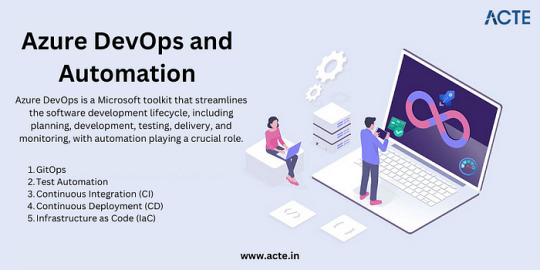#azure devops
Explore tagged Tumblr posts
Text

🚀 Join Us TODAY for an Exclusive Azure DevOps Demo! 🚀
💡 Ready to boost your DevOps skills? Learn about Azure DevOps in our hands-on online demo TODAY at eMexo Technologies! 🎓🔥 PLUS, we're offering an incredible 40% OFF for a limited time! 💥
📅 Don't Miss Out – The clock is ticking! ⏳ Gain real-world insights and start your journey to becoming a DevOps pro! 🛠️
👉 CLICK THE LINK https://www.emexotechnologies.com/courses/microsoft-azure-devops-training-course-az-400/ to secure your spot NOW! 💻✨
📅 25th Sept 2024 🧭 9 PM ( IST )
Format: Online Training
Contact Us For More Info:
📞 Phone: +91 9513216462
🌐 Website: https://www.emexotechnologies.com/
#azure devops#azure training#devops#cloud computing training#emexotechnologies#bangalore#electroniccity#traininginstitute#e learning#online courses#online training#tech education#tech skills#software training institute
2 notes
·
View notes
Text
Azure DevOps Training
Azure DevOps Training Programs

In today's rapidly evolving tech landscape, mastering Azure DevOps has become indispensable for organizations aiming to streamline their software development and delivery processes. As businesses increasingly migrate their operations to the cloud, the demand for skilled professionals proficient in Azure DevOps continues to soar. In this comprehensive guide, we'll delve into the significance of Azure DevOps training and explore the myriad benefits it offers to both individuals and enterprises.
Understanding Azure DevOps:
Before we delve into the realm of Azure DevOps training, let's first grasp the essence of Azure DevOps itself. Azure DevOps is a robust suite of tools offered by Microsoft Azure that facilitates collaboration, automation, and orchestration across the entire software development lifecycle. From planning and coding to building, testing, and deployment, Azure DevOps provides a unified platform for managing and executing diverse DevOps tasks seamlessly.
Why Azure DevOps Training Matters:
With Azure DevOps emerging as the cornerstone of modern DevOps practices, acquiring proficiency in this domain has become imperative for IT professionals seeking to stay ahead of the curve. Azure DevOps training equips individuals with the knowledge and skills necessary to leverage Microsoft Azure's suite of tools effectively. Whether you're a developer, IT administrator, or project manager, undergoing Azure DevOps training can significantly enhance your career prospects and empower you to drive innovation within your organization.
Key Components of Azure DevOps Training Programs:
Azure DevOps training programs are meticulously designed to cover a wide array of topics essential for mastering the intricacies of Azure DevOps. From basic concepts to advanced techniques, these programs encompass the following key components:
Azure DevOps Fundamentals: An in-depth introduction to Azure DevOps, including its core features, functionalities, and architecture.
Agile Methodologies: Understanding Agile principles and practices, and how they align with Azure DevOps for efficient project management and delivery.
Continuous Integration (CI): Learning to automate the process of integrating code changes into a shared repository, thereby enabling early detection of defects and ensuring software quality.
Continuous Deployment (CD): Exploring the principles of continuous deployment and mastering techniques for automating the deployment of applications to production environments.
Azure Pipelines: Harnessing the power of Azure Pipelines for building, testing, and deploying code across diverse platforms and environments.
Infrastructure as Code (IaC): Leveraging Infrastructure as Code principles to automate the provisioning and management of cloud resources using tools like Azure Resource Manager (ARM) templates.
Monitoring and Logging: Implementing robust monitoring and logging solutions to gain insights into application performance and troubleshoot issues effectively.
Security and Compliance: Understanding best practices for ensuring the security and compliance of Azure DevOps environments, including identity and access management, data protection, and regulatory compliance.
The Benefits of Azure DevOps Certification:
Obtaining Azure DevOps certification not only validates your expertise in Azure DevOps but also serves as a testament to your commitment to continuous learning and professional development. Azure DevOps certifications offered by Microsoft Azure are recognized globally and can open doors to exciting career opportunities in various domains, including cloud computing, software development, and DevOps engineering.
Conclusion:
In conclusion, Azure DevOps training is indispensable for IT professionals looking to enhance their skills and stay relevant in today's dynamic tech landscape. By undergoing comprehensive Azure DevOps training programs and obtaining relevant certifications, individuals can unlock a world of opportunities and propel their careers to new heights. Whether you're aiming to streamline your organization's software delivery processes or embark on a rewarding career journey, mastering Azure DevOps is undoubtedly a game-changer. So why wait? Start your Azure DevOps training journey today and pave the way for a brighter tomorrow.
5 notes
·
View notes
Text
Top FAQs about Azure DevOps Consulting

The complexity of modern software development is overwhelming you, don't you think? Do you want to increase output and simplify your processes? Azure DevOps can assist! To help you understand how Azure DevOps consulting can help your business, this blog article answers the most common questions regarding it.
Here are the key factors: ➡️ You can create automated testing and deployment pipelines, train your teams on best practices, and set up and configure DevOps services with the assistance of Azure DevOps specialists.
➡️ Businesses encounter difficulties with integration, security issues, and cultural opposition to change. You can overcome these obstacles by using consulting services.
➡️ Security is a top priority, and to guarantee compliance, consultants integrate security principles into your development pipeline.
➡️ It uses several features to optimize CI/CD pipelines for scalability and performance, and integrates with other tools.
Azure DevOps consulting might be a great help if you're trying to start from scratch or improve your current DevOps procedures.
Are you prepared to find out more? For a more thorough discussion of these subjects, visit the blog post!
4 notes
·
View notes
Text
Azure’s Evolution: What Every IT Pro Should Know About Microsoft’s Cloud
IT professionals need to keep ahead of the curve in the ever changing world of technology today. The cloud has become an integral part of modern IT infrastructure, and one of the leading players in this domain is Microsoft Azure. Azure’s evolution over the years has been nothing short of remarkable, making it essential for IT pros to understand its journey and keep pace with its innovations. In this blog, we’ll take you on a journey through Azure’s transformation, exploring its history, service portfolio, global reach, security measures, and much more. By the end of this article, you’ll have a comprehensive understanding of what every IT pro should know about Microsoft’s cloud platform.
Historical Overview
Azure’s Humble Beginnings
Microsoft Azure was officially launched in February 2010 as “Windows Azure.” It began as a platform-as-a-service (PaaS) offering primarily focused on providing Windows-based cloud services.
The Azure Branding Shift
In 2014, Microsoft rebranded Windows Azure to Microsoft Azure to reflect its broader support for various operating systems, programming languages, and frameworks. This rebranding marked a significant shift in Azure’s identity and capabilities.
Key Milestones
Over the years, Azure has achieved numerous milestones, including the introduction of Azure Virtual Machines, Azure App Service, and the Azure Marketplace. These milestones have expanded its capabilities and made it a go-to choice for businesses of all sizes.
Expanding Service Portfolio
Azure’s service portfolio has grown exponentially since its inception. Today, it offers a vast array of services catering to diverse needs:
Compute Services: Azure provides a range of options, from virtual machines (VMs) to serverless computing with Azure Functions.
Data Services: Azure offers data storage solutions like Azure SQL Database, Cosmos DB, and Azure Data Lake Storage.
AI and Machine Learning: With Azure Machine Learning and Cognitive Services, IT pros can harness the power of AI for their applications.
IoT Solutions: Azure IoT Hub and IoT Central simplify the development and management of IoT solutions.
Azure Regions and Global Reach
Azure boasts an extensive network of data centers spread across the globe. This global presence offers several advantages:
Scalability: IT pros can easily scale their applications by deploying resources in multiple regions.
Redundancy: Azure’s global datacenter presence ensures high availability and data redundancy.
Data Sovereignty: Choosing the right Azure region is crucial for data compliance and sovereignty.
Integration and Hybrid Solutions
Azure’s integration capabilities are a boon for businesses with hybrid cloud needs. Azure Arc, for instance, allows you to manage on-premises, multi-cloud, and edge environments through a unified interface. Azure’s compatibility with other cloud providers simplifies multi-cloud management.
Security and Compliance
Azure has made significant strides in security and compliance. It offers features like Azure Security Center, Azure Active Directory, and extensive compliance certifications. IT pros can leverage these tools to meet stringent security and regulatory requirements.
Azure Marketplace and Third-Party Offerings
Azure Marketplace is a treasure trove of third-party solutions that complement Azure services. IT pros can explore a wide range of offerings, from monitoring tools to cybersecurity solutions, to enhance their Azure deployments.
Azure DevOps and Automation
Automation is key to efficiently managing Azure resources. Azure DevOps services and tools facilitate continuous integration and continuous delivery (CI/CD), ensuring faster and more reliable application deployments.

Monitoring and Management
Azure offers robust monitoring and management tools to help IT pros optimize resource usage, troubleshoot issues, and gain insights into their Azure deployments. Best practices for resource management can help reduce costs and improve performance.
Future Trends and Innovations
As the technology landscape continues to evolve, Azure remains at the forefront of innovation. Keep an eye on trends like edge computing and quantum computing, as Azure is likely to play a significant role in these domains.
Training and Certification
To excel in your IT career, consider pursuing Azure certifications. ACTE Institute offers a range of certifications, such as the Microsoft Azure course to validate your expertise in Azure technologies.

In conclusion, Azure’s evolution is a testament to Microsoft’s commitment to cloud innovation. As an IT professional, understanding Azure’s history, service offerings, global reach, security measures, and future trends is paramount. Azure’s versatility and comprehensive toolset make it a top choice for organizations worldwide. By staying informed and adapting to Azure’s evolving landscape, IT pros can remain at the forefront of cloud technology, delivering value to their organizations and clients in an ever-changing digital world. Embrace Azure’s evolution, and empower yourself for a successful future in the cloud.
#microsoft azure#tech#education#cloud services#azure devops#information technology#automation#innovation
2 notes
·
View notes
Text
Navigating Efficient Strategies and Best Practices for AWS to Azure VM Migration
Migrating Virtual Machines (VMs) from AWS to Azure is a transformative step that can elevates cloud strategy. Whether driven by a need for advanced features, cost efficiency, or scalability, mastering the AWS migration to Azure process is essential for a smooth transition. This guide delves into effective strategies and best practices to ensure that migration is both efficient and effective.

Comprehensive Assessment of the Current Environment
The first step in any migration journey is thoroughly assessing the existing AWS environment. This involves a detailed review of EC2 instances, application dependencies, and network configurations. Tools like Azure Migrate can be utilized to conduct this assessment, which helps identify compatibility issues, performance metrics, and any specific requirements for the migration. A clear understanding of the current setup will facilitate a more seamless transition to Azure.
Strategic Planning and Preparation
A well-crafted migration plan is pivotal for a successful transition. Define the scope of migration by determining which VMs, applications, and data need to be moved. Develop a timeline and identify key milestones to track progress. Azure Site Recovery is a valuable tool in this phase, allowing for the orchestration and automation of the migration process. It ensures minimal disruption and downtime, enabling a smoother transition of AWS VMs to Azure.
Configuring and Optimizing the Azure Environment
Preparation is key to a successful migration. Set up Azure environment to align with the configurations of AWS setup. This includes configuring Azure Virtual Networks to match previous network settings and ensuring that Azure VMs are appropriately sized to handle workload. Azure provides various sizing options and performance settings that should be adjusted based on requirements. Optimizing these settings beforehand can enhance the performance and efficiency of new Azure environment.
Executing the Migration Process
With the plan and environment prepared, it is time to execute the migration. Utilize Azure's suite of migration tools to seamlessly migrate VM from AWS to Azure, ensuring a smooth and efficient transfer process. Tools like Azure Migrate and Azure Site Recovery offer comprehensive features to support this process, ensuring that data is transferred securely and efficiently. Monitor the migration process closely to address any issues that arise promptly. Effective monitoring can help mitigate potential disruptions and ensure the migration stays on track.
Post-Migration Validation and Optimization
Once the migration is complete, validate that all systems are operating correctly. Perform extensive testing to ensure that applications and data are accessible and functioning as intended in the Azure environment. Post-migration validation is crucial for identifying and resolving any issues that may have arisen during the migration process. Additionally, fine-tune Azure setup based on performance metrics and user feedback to optimize new environment for better performance and efficiency.
Ongoing Monitoring and Continuous Improvement
Migration is just the beginning of journey. Implement continuous monitoring and regular reviews of Azure environment to ensure it meets evolving needs - Leverage Azure's monitoring tools to track performance, security, and compliance. Regularly review and adjust configurations as necessary to keep pace with changing requirements and advancements in cloud technology.
Leveraging Azure's Advanced Features
Migrating AWS VMs to Azure unlocks advanced features like AI, machine learning, data analytics, and robust security tools. These tools optimize workflows, automate tasks, and enhance data-driven decision-making. Azure's AI services streamline operations, while its security offerings, such as Azure Security Center and Azure Sentinel, ensure a secure post-migration environment.
Cost Management and Optimization
Azure provides various pricing models and tools to help manage costs during and after migration. With Azure Cost Management and Billing, one can track spending and identify savings opportunities. Utilizing Azure's Reserved Instances and Spot VMs further reduces costs, maximizing the cloud investment.
Overcoming AWS to Azure Migration Challenges for a Smooth Transition
AWS to Azure migration presents compatibility issues, data complexities, and potential downtime. To mitigate these risks, develop a robust migration strategy with thorough testing and contingency planning. Leveraging Azure's monitoring and alerting tools ensures quick issue resolution, minimizing disruptions. Migrating from AWS to Azure introduces several complexities, including compatibility issues between different cloud architectures, challenges in transferring large volumes of data, and potential downtime during the switchover. Organizations often encounter differences in service offerings, networking configurations, and security models that require careful mapping and adaptation. To mitigate these risks, it is crucial to design a comprehensive migration strategy. This includes detailed workload assessments, phased migrations to reduce impact, and thorough testing of the migrated environment. Implementing contingency plans ensures business continuity in case of unexpected issues. Additionally, leveraging Azure’s monitoring and alerting tools enables proactive tracking of performance metrics and rapid troubleshooting, minimizing disruptions and ensuring a seamless transition.
Benefits of Migrating AWS VMs to Azure
Migrating AWS VMs to Azure offers several advantages, including cost savings, enhanced performance, and access to a wide range of advanced Azure services. Azure's cloud solutions provide robust capabilities that significantly improve operational efficiency and scalability Organizations gain access to a wide array of advanced services, including AI, analytics, and IoT solutions, which can drive innovation and streamline operations. Furthermore, Azure's integrated security and compliance features enable businesses to meet regulatory requirements effortlessly. By shifting to Azure, companies can also take advantage of native management tools that simplify cloud operations, improving scalability and aligning IT infrastructure with evolving business needs.
Conclusion
Migrating VMs from AWS to Azure offers significant benefits, including improved scalability, advanced cloud features, and cost efficiencies. However, this process also presents challenges, such as compatibility issues and potential downtime. With thorough planning, strategic execution, and ongoing optimization, these challenges can be effectively managed. By leveraging expert guidance and Azure’s robust tools, organizations can ensure a smooth transition that unlocks the full potential of Azure’s advanced cloud services, enabling better business outcomes.
#awscloud#cloudcomputing#amazonwebservices#azure migration#microsoft azure#azure services#azure devops
0 notes
Text
0 notes
Text
Sharing my latest solution into adding a user into Microsoft Azure DevOps Team via the REST API then making them an Admin of the team. This was a challenging find as the setting of Admin was not documented, so please feel free to share.
1 note
·
View note
Text

DevOps Online Course at Just Rs.6,000/- only...
Refer a friend and get Rs.1,000/- cash bonus...
Enroll Now !! or Refer a Friend...
Call as at +91 9487107243... Or Email us at [email protected] Or Visit https://www.svsitsolutions.in
#devops#devopsengineer#devopsengineering#devopsengineering#devopscommunity#devopstools#devopsjobs#devopsdays#devopsonlinetraining#devopsonline#devopsonlinecourse#devopstamil #devopscertification
#devops#devops certification#devops online training#online training#aws devops#azure devops#cloudcomputing#devops tools#information technology
0 notes
Text
Dynamics 365 Finance and Operations training programs
Explore comprehensive Dynamics 365 Finance and Operations training programs with Varnanz in Bangalore, India. Specializing in trade and distribution, our expert-led courses are designed to enhance your skills and knowledge in managing financials, supply chain, and operations efficiently.
Join us to advance your career with hands-on training and industry-recognized certifications.
0 notes
Text
Top FAQs about Azure DevOps Consulting

The complexity of modern software development is overwhelming you, don't you think? Do you want to increase output and simplify your processes? Azure DevOps can assist! To help you understand how Azure DevOps consulting can help your business, this blog article answers the most common questions regarding it.
Here are the key factors: ➡️ You can create automated testing and deployment pipelines, train your teams on best practices, and set up and configure DevOps services with the assistance of Azure DevOps specialists.
➡️ Businesses encounter difficulties with integration, security issues, and cultural opposition to change. You can overcome these obstacles by using consulting services.
➡️ Security is a top priority, and to guarantee compliance, consultants integrate security principles into your development pipeline.
➡️ It uses several features to optimize CI/CD pipelines for scalability and performance, and integrates with other tools.
Azure DevOps consulting might be a great help if you're trying to start from scratch or improve your current DevOps procedures.
Are you prepared to find out more? For a more thorough discussion of these subjects, visit the blog post!
1 note
·
View note
Text
How to Build CI/CD Pipeline with the Azure DevOps

Building a Continuous Integration and Continuous Deployment (CI/CD) pipeline with Azure DevOps is essential for automating and streamlining the development, testing, and deployment of applications. With Azure DevOps, teams can enhance collaboration, automate processes, and efficiently manage code and releases. In this guide, we'll walk through the process of building a CI/CD pipeline, including key components, tools, and tips. Along the way, we'll integrate the keywords azure admin and Azure Data Factory to explore how these elements contribute to the overall process.
1. Understanding CI/CD and Azure DevOps
CI (Continuous Integration) is the process of automatically integrating code changes from multiple contributors into a shared repository, ensuring that code is tested and validated. CD (Continuous Deployment) takes this a step further by automatically deploying the tested code to a production environment. Together, CI/CD creates an efficient, automated pipeline that minimizes manual intervention and reduces the time it takes to get features from development to production.
Azure DevOps is a cloud-based set of tools that provides the infrastructure needed to build, test, and deploy applications efficiently. It includes various services such as:
Azure Pipelines for CI/CD
Azure Repos for version control
Azure Boards for work tracking
Azure Artifacts for package management
Azure Test Plans for testing
2. Prerequisites for Building a CI/CD Pipeline
Before setting up a CI/CD pipeline in Azure DevOps, you'll need the following:
Azure DevOps account: Create an account at dev.azure.com.
Azure subscription: To deploy the app, you'll need an Azure subscription (for services like Azure Data Factory).
Repository: Code repository (Azure Repos, GitHub, etc.).
Permissions: Access to configure Azure resources and manage pipeline configurations (relevant to azure admin roles).
3. Step-by-Step Guide to Building a CI/CD Pipeline
Step 1: Create a Project in Azure DevOps
The first step is to create a project in Azure DevOps. This project will house all your CI/CD components.
Navigate to Azure DevOps and sign in.
Click on “New Project.”
Name the project and choose visibility (public or private).
Select a repository type (Git is the most common).
Step 2: Set Up Your Code Repository
Once the project is created, you'll need a code repository. Azure DevOps supports Git repositories, which allow for version control and collaboration among developers.
Click on “Repos” in your project.
If you don’t already have a repo, create one by initializing a new repository or importing an existing Git repository.
Add your application’s source code to this repository.
Step 3: Configure the Build Pipeline (Continuous Integration)
The build pipeline is responsible for compiling code, running tests, and generating artifacts for deployment. The process starts with creating a pipeline in Azure Pipelines.
Go to Pipelines and click on "Create Pipeline."
Select your repository (either from Azure Repos, GitHub, etc.).
Choose a template for the build pipeline, such as .NET Core, Node.js, Python, etc.
Define the tasks in the YAML file or use the classic editor for a more visual experience.
Example YAML file for a .NET Core application:
yaml
Copy code
trigger: - master pool: vmImage: 'ubuntu-latest' steps: - task: UseDotNet@2 inputs: packageType: 'sdk' version: '3.x' - script: dotnet build --configuration Release displayName: 'Build solution' - script: dotnet test --configuration Release displayName: 'Run tests'
This pipeline will automatically trigger when changes are made to the master branch, build the project, and run unit tests.
Step 4: Define the Release Pipeline (Continuous Deployment)
The release pipeline automates the deployment of the application to various environments like development, staging, or production. This pipeline will be linked to the output of the build pipeline.
Navigate to Pipelines > Releases > New Release Pipeline.
Choose a template for your pipeline (Azure App Service Deployment, for example).
Link the build artifacts from the previous step to this release pipeline.
Add environments (e.g., Development, Staging, Production).
Define deployment steps, such as deploying to an Azure App Service or running custom deployment scripts.
Step 5: Integrating Azure Data Factory in CI/CD Pipeline
Azure Data Factory (ADF) is an essential service for automating data workflows and pipelines. If your CI/CD pipeline involves deploying or managing data workflows using ADF, Azure DevOps makes the integration seamless.
Export ADF Pipelines: First, export your ADF pipeline and configuration as ARM templates. This ensures that the pipeline definition is version-controlled and deployable across environments.
Deploy ADF Pipelines: Use Azure Pipelines to deploy the ADF pipeline as part of the CD process. This typically involves a task to deploy the ARM template using the az cli or Azure PowerShell commands.
Example of deploying an ADF ARM template:
yaml
Copy code
- task: AzureResourceManagerTemplateDeployment@3 inputs: deploymentScope: 'Resource Group' azureResourceManagerConnection: 'AzureServiceConnection' action: 'Create Or Update Resource Group' resourceGroupName: 'my-adf-resource-group' location: 'East US' templateLocation: 'Linked artifact' csmFile: '$(System.DefaultWorkingDirectory)/drop/ARMTemplate.json' csmParametersFile: '$(System.DefaultWorkingDirectory)/drop/ARMTemplateParameters.json'
This task ensures that the Azure Data Factory pipeline is automatically deployed during the release process, making it an integral part of the CI/CD pipeline.
Step 6: Set Up Testing
Testing is an essential part of any CI/CD pipeline, ensuring that your application is reliable and bug-free. You can use Azure Test Plans to manage test cases and run automated tests as part of the pipeline.
Unit Tests: These can be run during the build pipeline to test individual components.
Integration Tests: You can create separate stages in the pipeline to run integration tests after the application is deployed to an environment.
Manual Testing: Azure DevOps provides manual testing options where teams can create, manage, and execute manual test plans.
Step 7: Configure Notifications and Approvals
Azure DevOps allows you to set up notifications and approvals in the pipeline. This is useful when manual intervention is required before promoting code to production.
Notifications: Set up email or Slack notifications for pipeline failures or successes.
Approvals: Configure manual approvals before releasing to critical environments such as production. This is particularly useful for azure admin roles responsible for overseeing deployments.
4. Best Practices for CI/CD in Azure DevOps
Here are a few best practices to consider when building CI/CD pipelines with Azure DevOps:
Automate Everything: The more you automate, the more efficient your pipeline will be. Automate builds, tests, deployments, and even infrastructure provisioning using Infrastructure as Code (IaC).
Use Branching Strategies: Implement a branching strategy like GitFlow to manage feature development, bug fixes, and releases in a structured way.
Leverage Azure Pipelines Templates: If you have multiple pipelines, use templates to avoid duplicating YAML code. This promotes reusability and consistency across pipelines.
Monitor Pipelines: Use Azure Monitor and Application Insights to keep track of pipeline performance, identify bottlenecks, and get real-time feedback on deployments.
Security First: Make security checks part of your pipeline by integrating tools like WhiteSource Bolt, SonarCloud, or Azure Security Center to scan for vulnerabilities in code and dependencies.
Rollbacks and Blue-Green Deployments: Implement rollback mechanisms to revert to the previous stable version in case of failures. Blue-Green deployments and canary releases are strategies that allow safer production deployments.
5. Roles of Azure Admin in CI/CD

An Azure admin plays a vital role in managing resources, security, and permissions within the Azure platform. In the context of CI/CD pipelines, the azure admin ensures that the necessary infrastructure is in place and manages permissions, such as creating service connections between Azure DevOps and Azure resources (e.g., Azure App Service, Azure Data Factory).
Key tasks include:
Resource Provisioning: Setting up Azure resources like VMs, databases, or storage that the application will use.
Security Management: Configuring identity and access management (IAM) to ensure that only authorized users can access sensitive resources.
Cost Management: Monitoring resource usage to optimize costs during deployments.
6. Conclusion
Building a CI/CD pipeline with Azure DevOps streamlines software delivery by automating the integration, testing, and deployment of code. Integrating services like Azure Data Factory further enhances the ability to automate complex workflows, making the pipeline a central hub for both application and data automation.
The role of the azure admin is critical in ensuring that resources, permissions, and infrastructure are in place and securely managed, enabling development teams to focus on delivering quality code faster.
#azure devops#azurecertification#microsoft azure#azure data factory#azure training#azuredataengineer
0 notes
Text

DataEdgeUSA integrated DevOps services to help speed up business processes and ensure high-quality software delivery. With our extensive knowledge and industry experience, we can help businesses develop and deploy dependable software applications on Microsoft Azure, Amazon AWS, and Google Cloud platforms.
0 notes
Text
Understanding Azure Information Protection Premium P1

Azure Information Protection Premium P1 is a comprehensive facts protection solution designed to assist organizations in classifying, labeling, and protecting touchy data. It offers many capabilities that empower businesses to control and display their statistics, ensuring that private records stay stable, whether or not they’re saved locally or within the cloud.
Azure Information Protection Premium P1 provides a comprehensive set of capabilities to safeguard sensitive data within an organization.
AVAIL FREE ASSESSMENT
#azure ai#microsoft azure partner#azure desktop as a service#managed it services#government managed services#azure services#azure#microsoft azure#azure devops#cyber security#microsoft services
1 note
·
View note
Text

DevOps Online Course at Just Rs.6,000/- only... Refer a friend and get Rs.1,000/- cash bonus... Enroll Now !! or Refer a Friend... Call as at +91 9487107243... Or Email us at [email protected] Or Visit https://www.svsitsolutions.in
#devops #devopsengineer #devopsengineering #devopsengineering #devopscommunity #devopstools#devopsjobs#devopsdays#devopsonlinetraining#devopsonline#devopsonlinecourse#devopstamil #devopscertification
#devops#devops online training#aws devops#azure devops#online training#devops tools#devops training#devops course#devops certification#devops consulting services#devopsculture#devopsengineer
1 note
·
View note
Text

Classroom & Online Training in Electronic City
👉Join our MS Azure DevOps Training In Electronic City Bangalore ✍️For Register https://www.emexotechnologies.com/
New Batch Details:
📅 Date: 28th November 2024 🧭 Time: 7:30 AM to 8.30 AM 📍 Location: Electronic City, Bangalore Mode of Training: Classroom/Online
💡 Why Choose Us?
✅ Hands-On Training ✅ Job Assistance & Interview Prep ✅ Access to Live Projects
For More Information: 📞 +91 9513216462 🌐 https://www.emexotechnologies.com/courses/microsoft-azure-devops-training-course-az-400/
#azuretraininginstituteinelectroniccitybangalore#azure devops#it training institute#certificationcourse#emexotechnologies#bangalore#electroniccity#traininginstitute#education#learning#course#training#careers#techeducation#onlinelearning
0 notes
Text
AZURE DATA ENGINEER

0 notes